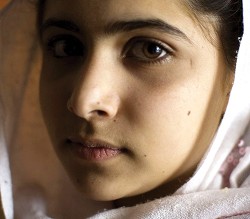In October, the world celebrated the Day of the Girl Child. Celebrations of girls and young women and their incomparable contributions to global progress echoed everywhere.
Malala Yousafzai’s powerful message
In October, the world celebrated the Day of the Girl Child. Celebrations of girls and young women and their incomparable contributions to global progress echoed everywhere.
That very same month, in Pakistan, Malala Yousafzai—a 15-year-old girl—was brutally attacked on her way home from school and shot in the head and neck by Taliban militants. Her crime? Proposing that girls should be allowed to attend school.
In some ways, this is a step backward. After all, in a month dedicated to the empowerment of girls, a very brave one was almost killed for wanting the most basic of rights.
As gruesome as this crime was, it signaled that Yousafzai and many others like her pose a deep threat to tyranny. A threat far greater than military action. A threat revealing that oppression can be undermined by courage found in the most unlikely places.
It all began in 2009, when the British Broadcasting Corporation asked Yousafzai to begin an online diary of her life under the Taliban regime. She was 11. Excerpts from her anonymous diary entries described how she “was afraid going to school because the Taliban had issued an edict banning all girls from attending schools. Only 11 students attended the class out of 27. The number decreased because of Taliban’s edict.”
She also wrote: “They banned women from going to the market, and they banned shopping.”
Over the next three years, this little girl would bravely raise her voice against the inequities and oppression around her.
“Yousafzai was one of the few brave voices who spoke out. Her blog…detailing the abuses meant that no one could pretend an accomodation with terrorists was anything other than a deal with the devil,” wrote Rob Crilly, the Daily Telegraph’s Pakistan correspondent.
Her voice is the power she wielded, and it’s voices just like hers that the Taliban tries to silence. By refusing girls and women the rights given to any man in Pakistan, the Taliban attempted to limit their existence to the four walls of their homes.
Yousafzai’s voice, however, broke out of this confinement—and beyond. Her story spread across the world, and she quickly became a symbol of hope and peace. Pakistan awarded her its National Peace Prize.
Eventually she shed the protection of anonymity and appeared on television, publicly promoting education for girls, something few adult men dared to do. She challenged terrorism with the strength and intelligence that she, as a woman, was not expected to display nor even be capable of.
On Oct. 9, Taliban gunmen stopped and boarded a school bus, asked which girl was Yousafzai and then unleashed a torrent of gunshots. Sustaining life-threatening bullet wounds to her head and neck, she was airlifted from her village and later taken to England, where she’s now on a very fortunate but slow road to recovery.
William Dobson, politics and foreign affairs editor of Slate Magazine, wrote of the attack on Yousafzai as a potential turning point in the Taliban’s influence. He wrote, “A teenage girl speaking out for girls’ education is just about the most terrifying thing in the world for the Taliban…a local, living advocate of progress, education and enlightenment. If people like [her] were to multiply, the Taliban would have no future.”
Indeed, that the Taliban would go to such lengths to eliminate one teenager reveals that they understand very well the power of the ideas she champions.
“There is no investment more effective for achieving development goals than educating girls,” the World Bank Group states on its website. Beyond being an enormous economic benefit and solution to poverty, educating girls results in overall improvement of communities’ health and social well-being.
It’s no surprise, then, that a terrorist group whose sole aim is to maintain absolute power over its people would do anything to stem the tide of hope, courage and empowerment that one little girl is part of.
Thirty days out of a year are not enough to celebrate the impact girls like Yousafzai have on the future of our globe. Every day should be a reminder that people—the most effective weapons against terrorism and regression—are daily offering their very lives to achieve the most basic of human freedoms.
All power to them.








